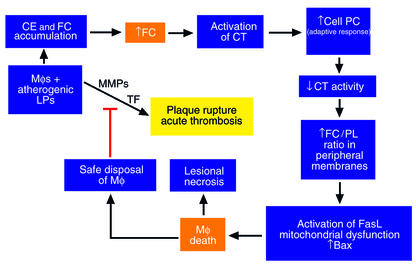Figure 3.
Hypothetical model relating FC loading of lesional macrophages (Mφs) to acute events in advanced atheromata. Progressive FC loading of lesional macrophages leads to a series of phospholipid-related adaptive responses, as described in the text. These adaptive responses eventually fail, leading to macrophage death (see Figure 2). On the one hand, macrophage death may contribute to plaque instability by promoting lesional necrosis. On the other hand, safe disposal of apoptotic macrophages could decrease the number of macrophages that secrete matrix metalloproteinases (MMPs), tissue factor (TF), and inflammatory cytokines. Because these molecules are thought to contribute to plaque rupture and acute thrombosis, macrophage death in this particular context might be protective.

